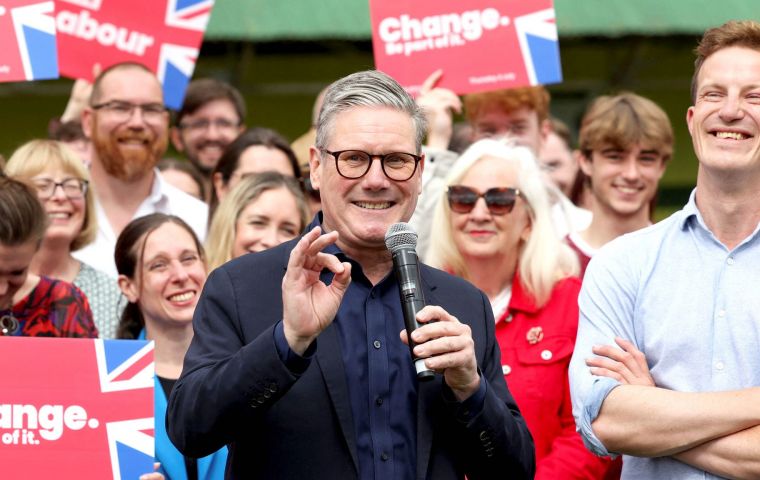MercoPress. South Atlantic News Agency
What can be expected on 4 July, Labour landslide or Conservative cataclysm
 Keir Starmer, leader of a renewed Labour party
Keir Starmer, leader of a renewed Labour party This Thursday's 4 general election in the United Kingdom could prove catastrophic for the Conservative Party and influence its future evolution. After 14 years in office, the Tories appear destined for what experts call the worst general election result in its 190-year history. The dimensions of this defeat would be such that, according to the polls, the current prime minister Rishi Sunak could even become the first head of government to lose his seat in the Commons.
Also from this perspective, only 53 Tory representatives could end up sitting in the British Parliament, with around three-quarters of the current members of Sunak's cabinet risking being excluded. The strategy of the outgoing prime minister, who recognized the probable victory of Labour on 4 July, seemed moreover oriented towards keeping a party in the process of fragmenting united, while at the same time trying to lose part of the ample advantage enjoyed by the opposition.
In their electoral manifesto, the Tories have in fact presented proposals such as tax cuts for pensioners, scaling back of climate objectives and a “firm” position on gender policies. This 80-page program has so far proved effective in sparking online reactions and fueling political debate. To try to attract further votes, the party has also promised further tax cuts, financed through a significant reduction in spending on welfare and public bureaucracy. However, behind the eye-catching promises, analysts point out that many Britons could see taxable income thresholds rise, while the Conservatives have remained vague on the specifics of welfare cuts.
And the issue of immigration remains, a central issue of Sunak's mandate and a clear line of demarcation with the Labour Party. The Tories have presented a new commitment for the general elections, announcing their intention to reduce regular immigration by establishing an annual cap on visas and finally giving the go-ahead to the much-debated program to send illegal migrants in Rwanda. During the election campaign, Sunak declared several times that his party was “the only one willing to take the bold action needed to reduce immigration figures”, promising to give parliament a direct role in setting immigration levels to the United Kingdom. However, Sunak's appears to be only the latest in a long series of Tory commitments on the topic: from the objectives of the former prime ministers David Cameron, Theresa May, to limit net immigration to “tens of thousands” of people, to the promise of Boris Johnson on a decline in “overall numbers” of migrants, to Sunak's pledge to “stop the boats“, crossing the Channel
Facts are that 14 years after the Conservatives entered Downing Street, net migration to the United Kingdom is two and a half times greater than the 2010 figure, and according to provisional figures released by the Home Office, in the first six months of In 2024, the total number of illegal migrants arriving on UK shores was 13% to 17% higher than the same period last year.
The immigration issue itself has proved to be a double-edged sword for Sunak, with many conservative voters turning to the far-right Reform UK party and its leader, Nigel Farage. Promoter of the Brexit referendum, Farage is attracting a growing number of supporters with the promise of ”taking our country back“. Although Reform UK has no seats in Parliament, it is likely to pose as much of a threat to the Tories as the ”official” opposition Labour Party in this Thursday's election.
The charismatic figure of Farage continues to have a weight in British politics: even if the post-Brexit national rebirth he promised has yet to materialize, the populist leader's power of attraction persists among voters in the poorest regions of the country . The Conservatives strategy has been to turn to the voters of these areas to prevent the Labour Party from obtaining a landslide victory. But some polls have seen a 17% preference for Reform not so far from a 20% for Conservatives.






Top Comments
Disclaimer & comment rulesCommenting for this story is now closed.
If you have a Facebook account, become a fan and comment on our Facebook Page!